For doctors working across the Maldivian atolls, hospital life can be both rewarding and exhausting. Long night shifts, emergency calls, and the constant pressure to stay alert can quickly take a toll. That’s why finding moments of stress relief isn’t a luxury — it’s part of staying healthy and effective.
Unlike city life, regional postings offer a quieter rhythm — and with it, beautiful opportunities for natural stress relief. Whether you’re stationed in Addu, Laamu, Baa, or Fuvahmulah, there are simple ways to recharge and find peace after demanding shifts.
🏖️ Island Beaches That Offer True Stress Relief
No matter which atoll you’re in, the Maldives’ greatest therapy is always nearby — the ocean.
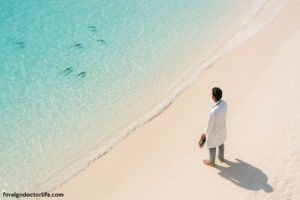
Uncrowded Shores Near Regional Hospitals
Many regional islands have quiet beaches where you can sit alone, listen to the gentle surf, and let go of the day’s worries. A few minutes by the water can bring more stress relief than hours of scrolling or sleeping restlessly.
Sunset Walks After Shift
Walking along the coastline at sunset can calm your heart rate and release mental tension. The combination of golden light and sea breeze naturally lowers stress hormones, offering deep stress relief before bedtime.
Morning Grounding by the Sea
If your duty ends at sunrise, spend ten minutes barefoot on the sand before heading home. Grounding — physically connecting with the earth — is proven to improve mood and promote stress relief naturally.
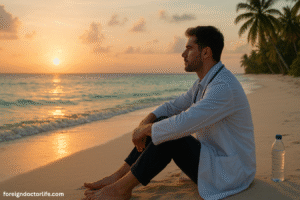
🌴 Local Escapes and Nearby Islands for Stress Relief
When you have a day or two off, exploring nearby islands within your atoll can be an excellent form of stress relief. Many local communities are friendly, calm, and surrounded by untouched beaches — no resorts or crowds needed.
Addu Atoll — Nature and Reflection
If you’re based in Addu, short visits to connected islands like Gan or Hithadhoo offer plenty of calm. Cycling along tree-lined roads or sitting near the causeway watching waves crash gently provides authentic stress relief in motion.
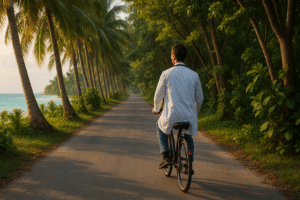
Laamu Atoll — Slow Living, Deep Breathing
Doctors in Laamu enjoy some of the Maldives’ most peaceful landscapes. Local islands like Maandhoo or Fonadhoo are perfect for quiet walks, evening swims, and mindfulness — a perfect recipe for stress relief between shifts.
Fuvahmulah — Island Serenity
Known for its freshwater lakes and unique environment, Fuvahmulah provides beautiful nature for mental reset. A short visit to Bandaara Kilhi or Dhadimagi Kilhi (two freshwater lakes) can help restore inner balance and stress relief through peaceful solitude.
Northern Atolls — Baa, Lhaviyani, and Raa
If you’re posted in these regions, short ferry rides between nearby inhabited islands allow refreshing micro-getaways. Walking through quiet fishing villages, sipping tea by the shore, or chatting with locals offers emotional stress relief and connection.
You can find verified local travel tips and ferry routes through the official Visit Maldives site for each atoll.
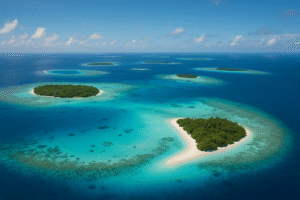
☕ Everyday Ways to Find Stress Relief on Remote Islands
When you work in regional settings, options may seem limited — but real stress relief comes from routine, not luxury.
The Power of Routine Calm
Create your own post-shift ritual: a shower, light meal, and five minutes of silence. Even small, repeated habits teach your brain to relax faster after high-pressure shifts.
Connecting With Locals
Joining evening tea sessions or island volleyball games can be surprisingly therapeutic. Social connection builds belonging — one of the strongest protectors against burnout and stress.
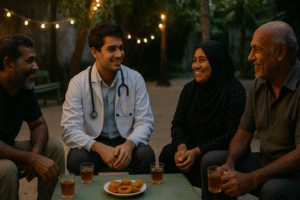
Journaling and Self-Reflection
Keep a small notebook or voice journal. Writing your thoughts after work helps process emotions and provides daily stress relief without needing technology or travel.
💆♂️Physical Self-Care Habits That Promote Stress Relief
Even in resource-limited environments, you can care for your body.
Movement and Stretching
After long hours standing or sitting, stretching improves circulation and reduces tension. The Mayo Clinic recommends daily flexibility exercises to prevent fatigue and improve posture — both vital for stress relief.
Hydration and Rest
Drink plenty of water, especially after humid shifts. Dehydration increases irritability and reduces focus, while hydration enhances your body’s natural stress relief responses.
Mindful Showers
Use your evening shower as a mental reset — focus on the feeling of water and deep breathing. Simple mindfulness turns ordinary routines into powerful tools for stress relief.
🌅 Using Weekends Wisely for Deep Stress Relief
If you get one or two days off between shifts, use them to reconnect with yourself — not your work.
-
Plan small island-hopping trips within your atoll.
-
Try local snorkeling or fishing activities with colleagues.
-
Spend time in nature, reading, or doing nothing at all.
These moments of stress relief reset your energy, improve your focus for the next week, and remind you why you chose this life of service.
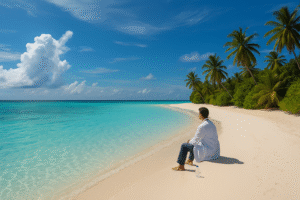
🌿 Daily Micro-Habits for Consistent Stress Relief
You don’t need hours — stress relief can happen in moments.
-
Practice deep breathing between patients.
-
Listen to calming music on the ferry ride home.
-
Watch the sunset from your balcony or clinic window.
-
Spend five minutes writing down what went well that day.
-
Prioritize quality sleep — your mind heals while you rest.
Even short pauses activate your body’s natural relaxation response. The American Psychological Association confirms that small, consistent habits protect against long-term stress damage.
👩⚕️ How Regional Doctors in the Maldives Find Stress Relief
Foreign doctors stationed in remote islands often find stress relief in the little things — friendly neighbors, quiet evenings, and slow island life. Many share similar coping strategies:
-
Morning beach walks before ward rounds.
-
Watching the sunrise with a cup of tea after night duty.
-
Building friendships with local staff to create emotional support.
-
Practicing gratitude for the peaceful surroundings and slower pace.
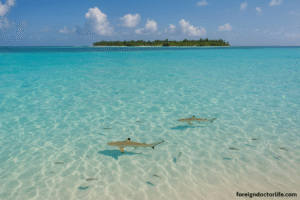
❓Common Questions About Stress Relief for Doctors
Q: How can I relax if I’m posted on a small island?
A: Focus on what’s around you — the sea, the breeze, the silence. Nature itself offers stress relief when you pay attention to it.
Q: What if there are no gyms or spas nearby?
A: Use bodyweight exercises, stretching, and breathing techniques. They’re free, simple, and effective for stress relief anywhere.
Q: How do I cope with isolation as a foreign doctor?
A: Stay connected online with family, but also build trust with local colleagues. Human connection multiplies stress relief and prevents loneliness.
Q: Why is stress relief important for regional doctors?
A: Because regional settings can be isolating — consistent stress relief keeps your motivation, empathy, and focus strong.
🌺 Final Thoughts: Finding Peace Beyond the Hospital Walls
Working in a regional health center can be demanding, but it also gives you access to something rare — untouched peace. The Maldives’ islands offer a natural sanctuary for stress relief, reflection, and balance.
When your shift ends, step outside. Let the warm wind and distant waves remind you that your healing matters too. True stress relief doesn’t need luxury — it needs presence, gratitude, and time to breathe.
Take care of yourself. Because in the quiet rhythm of these islands, healing begins again — with you.
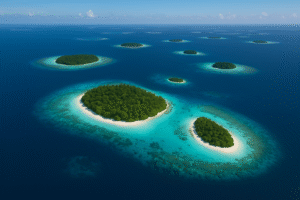
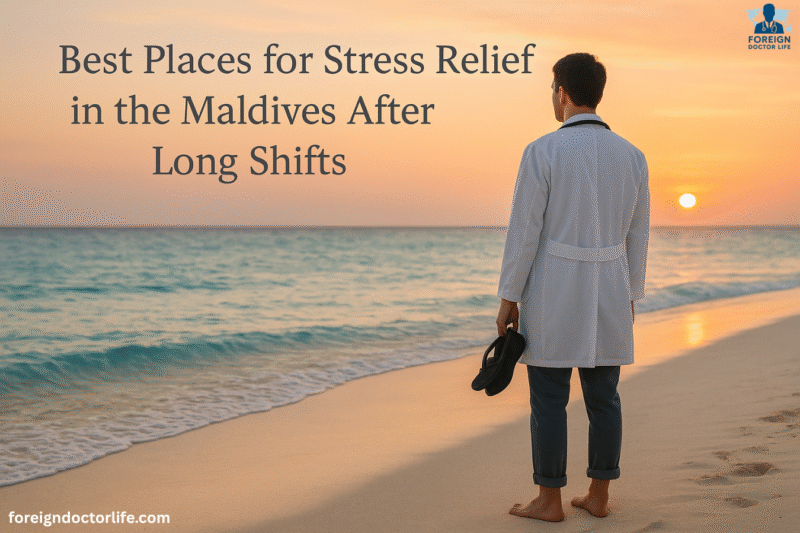



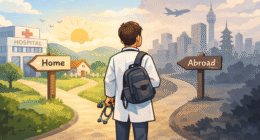

2 comments
Thanks lots…
Thanks